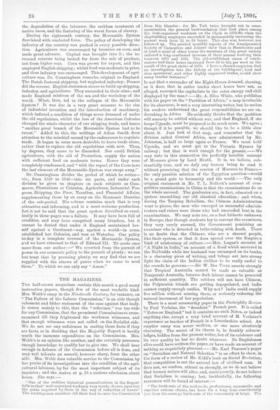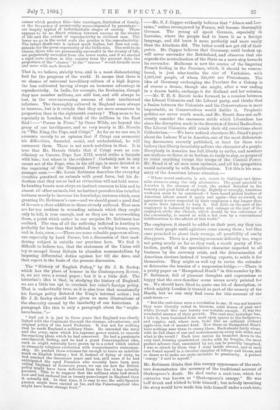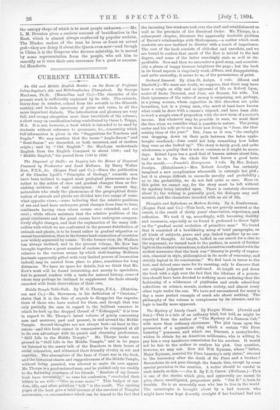THE MAGAZINES.
THE half-crown magazines contain this month a good many instructive papers, though few of the most readable kind. Mrs. Webb's essay in the Nineteenth Century, for instance, on " The Failure of the Labour Commission," is an able though vehement and bitter statement of the case against that body. It comes mainly to this, that the " reference " was too wide for any Commission, that the prominent Commissioners cross- examined till they frightened the workmen witnesses, and that enough witnesses were not called on the Socialist side. We do not see any unfairness in stating those facts if they are facts, or in deciding that the Majority Report is hardly worth the immense expenditure on the Commission. Mrs. Webb's is an opinion like another, and she certainly possesses enough knowledge to qualify her to give one. We shall hear enough in defence of the Commission before all is done, and may well tolerate an assault, however sharp, from the other side. Mrs. Webb does valuable service to the Commission by her praise of its investigations into the condition of the agri- cultural labourer, by far the most important subject of its inquiries; and she makes at p. 13 a curious admission about hours. She says a- " One of the reckless historical generalisations in the Report tells us that well-organised workmen very rarely, if ever, have lost the gains acquired by them in the way of reduction of hours.' The working-men members did their best to save the Commission
from this blunder ; for Mr. Tait twice brought out in cross- examination the general backwardation that took place among the best-organised workmen on the Clyde in 1879-80, when the shipbuilding employers succeeded in permanently increasing the normal week from 51 to 54 hours. This clue was, however, not followed up. The printed monthly reports of the Amalgamated Society of Carpenters and Joiners show that in Manchester and at least a score of other towns the members of this great society suffered a long-continued increase of their normal working time between 1875 and 1885. The old-established union of coach- makers had their hours increased from 53 to 5Ci per week as the result of the great strike of 1878. I have a shrewd suspicion that an investigation into the history of the bricklayers', boot and shoe operatives', and other highly organised trades, would show many similar instances."
Is not that a surrender of the Eight-Hours demand, showing, as it does, that in entire trades short hours have not, as alleged, recouped the capitalists in the extra energy and skill displayed by the men ?--Mr. A. Silva White, who publishes with his paper on the "Partition of Africa," a map invaluable for its clearness, is not a very interesting writer, but he makes his readers understand the great responsibilities we are un- dertaking in Africa. He evidently thinks that the partition will scarcely be settled without war, and that England, if she keeps Uganda, must be prepared to do much more. We agree ; though if it be possible, we should like to be a little slow about it. Just look at that map, and remember that the division called Central Africa, now administered by Mr. Johnston, is half as large again as France. We must hold Uganda, and we must get to the Victoria Nyanza by railway ; but that is work enough for the present.—We may note in this connection the perfectly horrible account of Morocco given by Lord Meath, It is, we believe, sub- stantially true, and we defy any human being to read it without perceiving that the cession of Morocco to France— the only possible solution of the Egyptian question—would be a grand gain to humanity and the world.—The only original statement in Mr. T. L. Bullock's account of com- petitive examinations in China is that the examinations do on the whole succeed. The graduates are, in fact, educated on a system resembling our old classical education ; and when, during the Taeping Rebellion, the Chinese Administration went to pieces, the men who emerged as successful adminis- trators and rulers were those who had succeeded best in the examinations. We may note too, as a fact hitherto unknown in Europe, that though students try to corrupt the examiners, they very rarely succeed, the Government punishing an examiner who is detected in bribe-taking with death. There is no doubt that the Chinese, who are a shrewd people, like their system, or that it does spread over the Empire a kind of aristocracy of culture.—Mrs. Logan's account of " A Night in India," an account of a flood which occurred in the Nerbudda while her husband was encamped on its banks, is a charming piece of writing, and brings out into strong light the claim of the Indian civilian to be really useful to the crowds he governs.—Sir W. Des Vecux asserts strongly that Tropical Australia cannot be made as valuable as Temperate Australia, because dark labour cannot be procured in sufficient quantity. The settlers will not have Chinese, the Polynesian islands are getting depopulated, and India cannot supply enough coolies. Why not? India could supply five million without missing them, or seriously reducing the natural increment of her population.
There is a most noteworthy paper in the Fortnightly Review by Paul Verlaine, the "decadent" French poet. It is called " Notes on England," but it contains no such Notes, or indeed anything else, except a very brief account of M. Verlaine's experience as teacher of French in a Lincolnshire school. An emptier essay was never written, or one more absolutely charming. The secret of its charm is, he frankly acknow- ledges, hidden from the present writer, but of its existence and its rare quality be has no doubt whatever. No Englishman alive could have written the paper, or have made an account of nothing so exquisitely pleasant.—Mr. Karl Pearson's paper on "Socialism and Natural Selection" is an effort to show, in the form of a review of Mr. Kidd's book on Social Evolution, that competition is not the natural law of civilised man. It does not, we confess, attract us strongly, as we do not believe that human nature will alter, and, consequently, do not believe that Socialism is coming; but, incidentally, the following sentences will be found of interest :— " The birth-rate of the well-to-do, professional, mercantile, and superior artizan classes, has been for a long time considerably less than the average birth-rate of the community at large. The
causes which produce this—late marriages, limitation of family, or the frequency of promiscuity unaccompanied by parentage— are largely typical of individualistic stages of society. There appears to be no direct relation between success in the rivalry of life and the extent of reproductivity in civilised man. The lower we go in the social scale the greater is the reproductivity. The infant death-rate is indeed much higher, but does not com- pensate for the great superiority of the birth-rate. The well-to-do classes, those who are presumably successful in the rivalry of life, are perpetually recruited from the lower ranks, and if we started a rigid caste system in this country from the present date, the proportion of the " classes " to the " masses " would dwindle more and more with each decade."
That is, we believe, strictly true, and is a most disheartening fact for the progress of the world. It means that there is no chance of universal hereditary culture of a high degree, the less cultivated having always an immense advantage in reproductivity. In India, for example, the Brahmins, though they now number millions, are still lost, and will always be lost, in the ever-increasing swarms of their intellectual inferiors. The thoroughly cultured in England seem always to increase, but is it certain that they are more numerous in proportion than in the eighteenth century P They seem to be, especially in London, but think of the millions in the East End !--" Poems in Prose," by Oscar Wilde, are beyond the grasp of our intelligence, and so very nearly is Mr. Haweis on " The King, the Pope, and Crispi." As far as we can see, it amounts merely to an opinion that if Crispi can surmount his difficulties, financial, social, and ecclesiastical, he will surmount them. There is not much nutrition in that. It is true that Mr. Haweis thinks that if Crispi were as con- ciliatory as Cavour, Pope Leo XIII. would strike a bargain with him ; but where is the evidence P Certainly not in any recent act of the Pope, who, in his old age, is more devoted to the regaining of the Temporal Power than he was as a younger man.—Mr. Louis Robinson describes the everyday cruelties practised on animals with great force, but his de- duction that they are as bad as vivisection will not hold water. In hunting beasts man obeys an instinct common to him and to almost all other animals, but no instinct provokes him to inflict tortures merely to increase his knowledge, tortures which, even granting Dr. Robinson's case—and we should grant a good deal of it—are a clear addition to those already suffered. That men are far too reckless in wounding animals which they ought only to kill, is true enough, and so they are in overworking them, a point which rather to our surprise Dr. Robinson has omitted. The sum of all the suffering inflicted in hunting is probably far less than that inflicted in working horses, asses, and in Asia, oxen.—There are some valuable papers on silver, one especially by Lord Farrer, but a discussion of that mad- dening subject is' outside our province here. We find it difficult to believe too, that the statesmen of the Union will try to compel Great Britain to abandon monometallism by imposing differential duties against her till she does, and that report is the basis of the present discussion.
The "History of English Policy," by Sir J. R. Seeley, which has the place of honour in the Contemporary Review, is, we are sure, a sound paper ; but it is a little 41111. The historian's idea is that, in studying the history of England, we are a little too apt to overlook her ruler's foreign policy. That is undoubtedly true, as it is also true that occasionally his foreign policy dictated the King's internal action ; but Sir J. R. Seeley should have given us more illustrations of the obscurity caused by the insularity of our historians. A Paragraph like this is only a paragraph about the " might- have-beens ",-
"And yet it is just in those years that England was closely linked with the Continent through the strange, adventurous, and original policy of the Lord Protector. It was not for nothing that he made England a military State. He intended the navy -and the army, upon which his supreme power rested, to execute far-reaching plans which ho had conceived. He had a passionate anti-Spanish feeling, and he had a great Panevangelical idea, such as might naturally have grown up in a mind which united so strangely religious exaltation with comprehensive statesman- ship. He pushed these schemes far enough to leave an indelible mark on English history ; but if, instead of dying at sixty, he had reached the threescore years and ten, still more if he had anticipated the aged Premiers who recently have been seen ruling England at fourscore years, we can see how far British policy might have been deflected from the line it has actually pursued. This is to suppose that the military state had struck root and had endured ten or twenty years longer in England than it actually did. In that time, it is easy to see, the anti-Spanish passion might have carried us far, and the Panevangelical idea might have borne strange fruit." —Mr. S. J. Capper evidently believes that " Alsace and Lor- raine," unless reconquered by France, will become thoroughly German. The young all speak German, especially in Lorraine, where the people had to learn it as a foreign language, and did learn it more perfectly and more easily than the Alsatians did. The latter could not get rid of their patois. Mr. Capper believes that Germany, until broken up, will never surrender the Reichsland, and observes that she regards the neutralisation of the State as a mere step towards its surrender. Mulhouse is now the centre of the lingering French feeling in the Province, which, it should be remem- bered, is just nine-tenths the size of Yorkshire, with 1,603,000 people, of whom 320,000 are Protestants. The idea of Germany exchanging the Province for a Colony is of course a dream, though she might, after a war ending in a drawn battle, exchange it for Holland and her colonies. —Mr. T. H. S. Escott looks forward to a reunion between the Liberal Unionists and the Liberal party, and thinks that a fusion between the Unionists and the Conservatives is most improbable, as Conservatives would dislike it. Prophetic politics are never worth much, and Mr. Escott does not suffi- ciently consider the enormous stride which Liberalism has since the disruption made in the direction of Social Radicalism. The Liberal Unionists still retain their old convictions about Colleotivism.—We have noticed elsewhere Mr. Stead's paper about the Labour War in America, one of the most dishearten- ing documents recently published, at least for those who believe that liberty invariably softens the character of a people. Everybody in America has full liberty to strike, and nowhere are strikers so fierce or so lawless, so ready to slay, so prepared to resist anything except the troops of the Central Power. Mr. Stead is of all men most optimist, and all his sympathies would naturally be with Republicanism. Yet this is his sum- mary of the American labour situation :— " Where moral authority is not, resort to Gatlings and dyna- mite seems to many the only alternative. The great mischief in America is the absence of trust, the rooted disbelief in the honesty and good faith of anybody. Rightly or wrongly, American workmen seem to be convinced—I have heard picked leaders of American labour assert it again and again—that no award, no agreement is ever respected by their employers a day longer than it suits their interest to keep it. Bad faith on the part of the employers is balanced by murder and outrage on the part of the employed, while the Church, which should be the conscience of the community, is seared as with a hot iron by a conventional indifferentism to the affairs of this world."
The employers, it should be added on their part, say they can trust their people until agitators come among them ; but that once preached to about their wrongs, all possibility of amity disappears. There is a growing economic difficulty too, wages not going nearly as far as they used, a result partly of Pro- tection, partly of the speculative character imparted to all business by the currency crisis, and the determination of American electors instead of trusting experts, to settle it for themselves. They might as well try to revise the calendar or determine the tension of a suspension-bridge.—There is a pretty paper on " Hampstead Heath" in this number by Mr. P. Robinson, full of pleasant thoughts and expressions so happy that the over-familiar scene seems newly painted for us. We should have liked to quote one bit of description, in which mighty London is treated as part of the scenery of the Heath, but we can only find room for this account of the crab-trees :—
" But the crab-trees were a revelation to me, It was not because they were literally veiled in blossom, solid domes of pink and white, though this rare beauty was notable enough. It was the wonderful manner of their growth. The crab-tree nowadays has, I take it, been banished from most open spaces to the hedgerows and coppice, and, where seen, looks like an ordinary orchard apple-tree, but of meaner kind. Now these on Hampstead Heath have nothing near them to cramp them. Each stands fairly alone, with its full share of sun and nourishment on every side alike, and what is the result? Each tree carries its branches down to the very turf, forming symmetrical circles with its boughs, the most perfect arbours that, unassisted by art, can be possibly imagined,
was so struck by them that I went inside several, and in each case found myself in a circular chamber of foliage and bloom, and so dense as to make me quite invisible to passers-by. A perfect ' canopy ' I said to myself."
Mr. Robinson thinks that this canopy appearance of the crab- tree demonstrates the accuracy of the traditional account of Shakespeare's death. He died under a crab-tree, which for centuries was known as " Shakespeare's canopy." He was half drunk and wished to hide himself ; but nobody inventing , the story would have made him hide himself under a crab-tree, the canopy shape of which is to most people unknown.—Mr. L. M. Brunton gives a curious account of beatification in the East, which is almost always conferred by popular acclaim. The Hindoo makes of the man he loves or fears an actual god—they are doing it about the Queen even now—and though in China it is the Emperor who decrees saintship, he is moved by some representation from the people, who ask him to sanctify as it were their own reverence for a good or success- ful Mandarin.












































 Previous page
Previous page